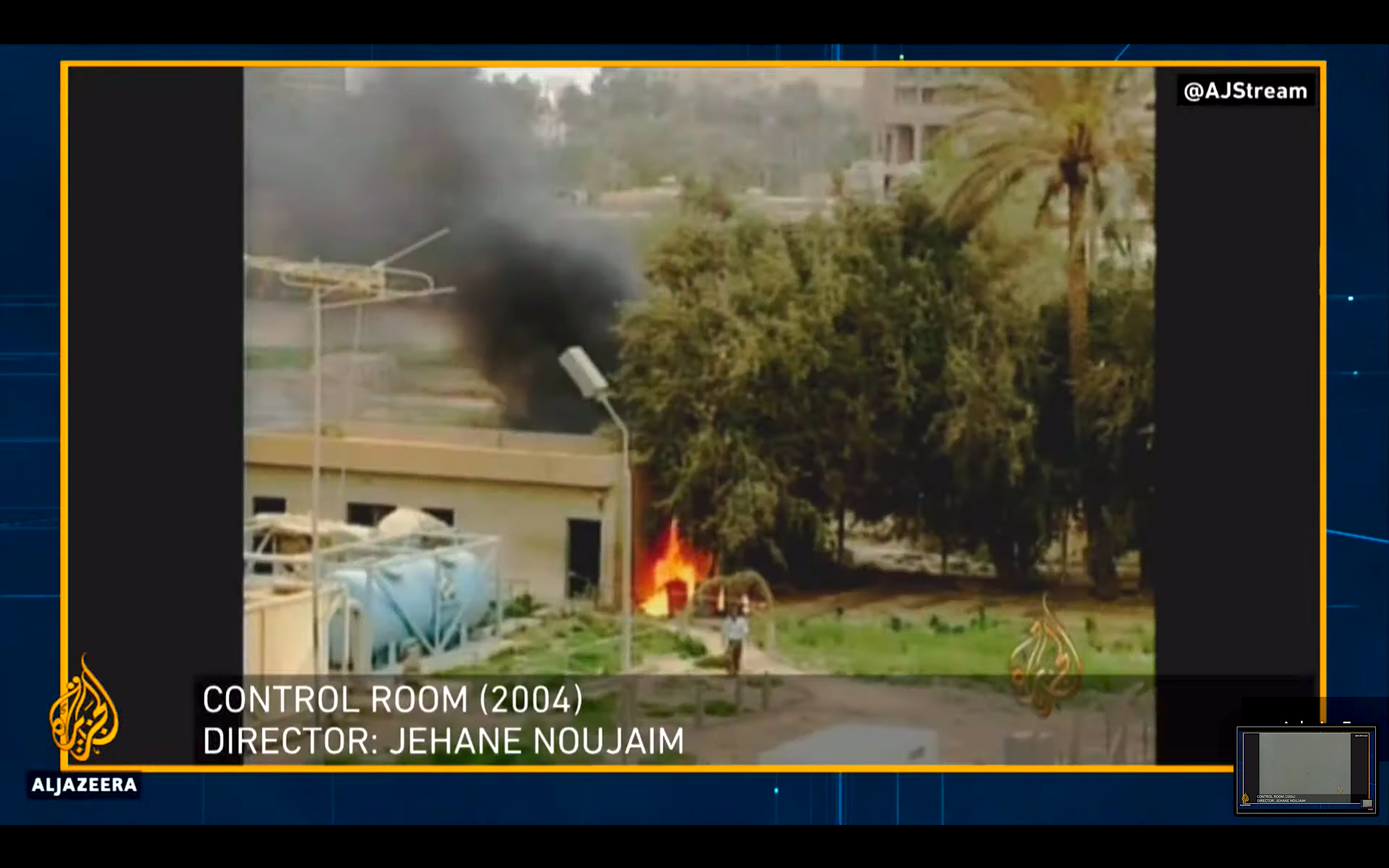There was an inevitable conflict in the roles of the Arab television network that inexorably led to its decline, writes As’ad AbuKhalil.
By As`ad AbuKhalil
Special to Consortium News

The launch of the Aljazeera television network 25 years ago this month in 1996 was a monumental event in the contemporary history of Arab media. One can easily compare it to the rise of Voice of the Arabs, the Egyptian radio broadcast founded by Gamal Abdel Nasser in Egypt in 1953.
Voice of the Arabs was available on shortwave radio throughout the Arab world, spreading Nasser’s message. No book on that era is complete without a reference to that radio service. It had a tremendous impact on the formation of Arab public opinion for decades until its demise after 1967, when Egyptian media was caught lying to the Arab people about the reality of defeat during the early days of the Arab-Israeli war.
The radio station that articulated the hopes of the Arab nation suddenly stood as a symbol of its incompetence and deception. No media replaced the Voice of the Arabs at the pan-Arab level until the rise of Aljazeera in 1996. Similarity between the two services ends there.
Aljazeera came into existence at a time of regional political instability in the Arabian peninsula. The then emir of Qatar, Hamad bin Khalifa Al-Thani, came to power in 1995, having overthrown his father. That family coup so disturbed the Saudi royal family that they tried to overthrow al-Thani a year later. Riyadh felt that any deviation from the established line of succession would amount to a betrayal of centuries-old traditions that have been key to stable political succession.
(Of course, Saudi Crown Prince Muhammad bin Salman has violated those norms and the lines of succession to make himself the sole successor to his father, King Salman).
Hamad bin Khalifa al-Thani blamed Saudi Arabia for the 1996 counter-coup attempt and began to chart new foreign and defense policies that were directed at the Saudi threat (he justified his invitation to host U.S. troops as a protection against his powerful neighbor).
Aljazeera, which is owned by the Qatari government, was launched with a wide parameter of expression not seen in Arab media before. To be sure, there were red lines: not much was said about oil and gas policies, nor about the monopolies of royal families and the internal politics of Qatar.
As a guest on Aljazeera many times I can attest that the network does not accommodate views that are critical of the Qatari royal family. (My last appearance a decade ago was after I challenged the network on live TV about its preferential treatment of American officials and its attempt to suppress criticisms of Qatari foreign policy.)
No Competitors
 Aljazeera was a huge success and it had no competitors at the time. There was the Saudi-owned media empire, MBC, which was started in London in 1991 by a brother-in-law of King Fahd as the first Arab satellite channel. It was aimed at drawing Arab audiences with silly entertainment and sports shows and with less emphasis on politics: whatever news that was allowed was strictly within the parameters of Saudi foreign policy.
Aljazeera was a huge success and it had no competitors at the time. There was the Saudi-owned media empire, MBC, which was started in London in 1991 by a brother-in-law of King Fahd as the first Arab satellite channel. It was aimed at drawing Arab audiences with silly entertainment and sports shows and with less emphasis on politics: whatever news that was allowed was strictly within the parameters of Saudi foreign policy.
Even TV serials on MBC carry blatant political agendas: either an anti-Shiite message (Al-Faruq, on caliph `Umar Ibn Al-Khattab, for example) or a blatant Zionist message in the serial Um Harun, for example. The latter was the first TV entertainment show to disseminate the Zionist agenda into Arab homes.
Aljazeera gave Arab audiences what they had been waiting for for decades: an Arabic chat and news political channel. A debate show, which brought two opposite political views (Al-Ittijah Al-Mu’akis), was an instant hit. The show was 90-minutes long (Arab audiences don’t suffer from American short attention spans). The presenters became instant celebrities.
Most Arab homes were tuned in to Aljazeera especially when there was a breaking story; the only alternatives to Aljazeera were regime-owned TV stations that were dogmatically propagandistic. It is not that Aljazeera was not serving a propaganda interest of the Qatari regime; but it also provided a wide margin of expression never seen before by Arab audiences.
There was much emphasis in those early years on Saudi Arabia and the channel highlighted human rights abuses there. Not all countries were treated equally, as allies of Qatar received better coverage. But the early managers and editors of the network were secular Arab nationalists and that appealed to many Arabs throughout the world. Even Arab-Americans subscribed to the Dish Network in order to receive Aljazeera broadcasts.
My first appearance on the network in 2001 was to speak about Saudi Arabia. The channel mixed political talk shows and very serious round-ups of news. Experienced and talented correspondents were hired and offices were established around the world. The Arab media scene had never experienced something similar, and themes about Arab unity and nationalism galvanized the audience.
But many Arabs had complaints about the coverage:
- the network hosted a weekly religious show with Yusuf Qardawi, a former Muslim Brotherhood preacher with very conservative views. His version of Islam was appealing to conservative Arab regimes who opposed Nasser—the man who successfully marginalized the Muslim Brotherhood around the Arab world;
- the network was the first to host Israeli guests; officials of the Israeli government and military were regulars on political shows (they did receive tough treatment—unlike on Western shows—but the precedent was appalling to many Arabs whose sensibilities were offended in the extreme);
- the network was increasingly getting defensive about the U.S. government and it gave ample platforms for U.S. officials to spew their propaganda. But the network’s championing of the Palestinian cause and its critical coverage of the U.S. invasion of Iraq in 2003 pleased Arab audiences (although the U.S. military responded by simply bombing Aljazeera’s office in Baghdad, which killed their chief correspondent).
The U.S. government and Arab regimes became alarmed over the increasingly important role of Aljazeera. Offices were banned, but the channel’s broadcasts were hard to censor. Saudi Arabia was most concerned because Saudi dissidents (like Sa`d Al-Faqih) would appear on the channel and call for protests on certain days (surprisingly, there were people who responded to such calls under the repressive regime).
The U.S. (in Congress and the media) became more vocal in their attacks on Aljazeera with journalists and politicians calling for its ban from U.S. cable carriers (the U.S. government routinely bans “undesirable” channels from the U.S. without much opposition from U.S. media).
Saudis Respond
The Saudi government quickly scrambled to produce its own political propaganda news channel and in March 2003 – just in time to provide favorable coverage of the U.S. invasion of Iraq — Al-Arabiya TV channel was launched to serve Saudi and U.S. interests. The network had a much narrower margin of coverage and only hosted opposition figures form countries that were not aligned with the U.S. and Saudi Arabia.
Aljazeera remained the leading channel although Al-Arabiya gained ground. The U.S. government was very pleased with the new Saudi channel and senior U.S. officials (including president George W. Bush) were made available for interviews, while many U.S. officials boycotted Aljazeera outright.
It was in 2011 that the story of the decline of Aljazeera began. Prior to that in 2008, the Qatari and Saudi governments reconciled and that resulted in much tamer coverage of Saudi Arabia by the network. The Saudi government requested that Saudi opposition figures not be allowed on the network (The Emir of Qatar in 2010 informed me that the Saudi king asked him to ban me from the network).
But the biggest change in the network’s coverage occurred in 2011, when the channel fell under the control of the Muslim Brotherhood and their affiliates. All secular Arab nationalists were pushed out of the station and new religious-oriented staff was brought in. With the beginning of the Arab uprising that year the network dropped all professional pretenses and adopted a more overtly propaganda line in calling for the overthrow of governments where change was favorable to the Muslim Brotherhood (such as in Egypt and Tunisia).
The channel passionately urged the toppling of Egyptian President Hosni Mubarak, but refrained from advocating the overthrow of the King of Bahrain next door. If anything, the network supported the Saudi invasion of Bahrain to crush its rebellion.
Reasons for Decline
It was around that time that Arabs started to abandon the channel in droves.
There are no reliable figures to document the decline of Aljazeera and the channel still claims to have a leading position among Arab media. But many factors have brought about the decline of Aljazeera:
- the control by the Muslim Brotherhood of the network drastically undermined its professionalism;
- U.S. pressure on Qatar softened the coverage of the U.S. The director-general of Aljazeera told me how the U.S. embassy in Doha submitted regular critical reports about the coverage of Aljazeera demanding that changes be made. In 2009, Haim Saban, the Israeli-American media mogul, tried to purchase the channel.
- the use of Aljazeera either to first offend and then appease Saudi Arabia turned the network away from journalism and towards propaganda.
- the rise of local channels in Arab countries damaged the ratings of all pan-Arab channels, like Al-Arabiya, Aljazeera and MBC.
- the resort to sectarian agitation by some personalities on Aljazeera, and the pro-Taliban, pro-al-Qa`ida sympathies of some Aljazeera correspondents (like Ahmad Zaidan), hurt the image of the network with the larger Arab audience and narrowed the appeal and audience share of the channel.
Aljazeera was one of the most interesting cases of a new Arab media in the 21st century; it promised a break from traditional stale and rigid Arab news broadcasts but eventually failed in its mission. The early years of the network showed more professionalism in news than is seen on U.S. TV networks.
But the Qatari government’s control of the channel would inevitably cause a conflict between its professional mission and its propaganda role. Propaganda won and the Arab public is the worse for it.
As`ad AbuKhalil is a Lebanese-American professor of political science at California State University, Stanislaus. He is the author of the Historical Dictionary of Lebanon (1998), Bin Laden, Islam and America’s New War on Terrorism (2002) and The Battle for Saudi Arabia (2004). He tweets as @asadabukhalil
The views expressed are solely those of the author and may or may not reflect those of Consortium News.




As a US english speaker, is watch Aljazeera because it covers world affairs with no commercial advertising, and because other MSM TV outlets have gotten so bad. I find the news is in line with US corporate media but I can get opposing views from other sources like this web site.
See also Kevork Almassian, a Syrian of Armenian origin, living in Germany
WATCH: My story with Al Jazeera
hXXps://www.syriana-analysis.com/watch-my-story-with-al-jazeera/?fbclid=IwAR1rSyXlpmRcZz4RhYMBCnpfGIOdfXkOPgXw0YMgUITwHH6_dlHPmxLORwY
“There are no reliable figures to document the decline of Aljazeera…” Ignoring the Arabic diaspora viewership and readership and also the digital penetration of non-broadcast international audience might support the thesis of declining influence, but such a claim at this point is literally ‘incredible’. Also, the non-news but in-depth documentary catalogue of human interest and environmental reporting DWARFS any so-called competitor. Where else can one go online and watch in-depth documentary pieces produced as long ago as 15 or more years concerning impact of refugees, farming, or war on wildlife populations or watersheds? It is notably difficult to estimate audience (especially broadcast, the antique communications platform for those born in the 20th century) and sale of said audiences is tainted with bluff and exaggeration, but most estimates of Al Jazeera’s impact are strongly at odds with this piece.
I miss Robert Fisk of the Independent. He was upfront about his view but covered the facts well.
It was apparent that the jig was up three years ago
when Al Jazeera suppressed its revelatory documentary
“The Lobby” on underhanded Israeli manipulations
of Americans, especially on campus.
AJ had broadcast the equally stunning first four-parter doc,
on Israel’s underhanded manipulations in British politics
and promised to broadcast the U.S. equivalent. But after
Alan Dershowiz flew to Qatar and various American Zionists,
including high government officials, pressured the emir,
the doc never appeared on AJ.
(Fortunately, it was leaked to the Electronic Intifada
and other sites, where you can still see it.)
I agree. Aljazeera is not what it once was, and even relies on agencies like Bloomberg to cover financial news which, more than anything, tailors what is happening rather than the truth. Aljazeera has lost its way, its bite, but still, fortunately, has a slight taste of what it once was, even though the flavor continues to rot.
Thank you for this very informative and well written piece!
As an English speaker I missed the heyday of Al Jazeera, but when Al Jazeera English arrived in 2007 I was very impressed by its coverage of the occupations of Palestine, Afghanistan and Iraq. It also provided a refuge for many journalists and producers forced out of the BBC in the aftermath of David Kelly’s mysterious death. By the time Obama arrived in the oval office and Clinton became ensconced in Foggy Bottom things were already starting to deteriorate, but in 2011 the channel dropped any pretense of being anything other than a Western and Muslim Brotherhood proxy.
Al Jazeera played a key role in propagating the ‘Viagra Squad’ propaganda in Libya, resulting in the lynching of many Black Libyans. It was also at the center of the chemical weapons deception in Syria, with its correspondents intimately involved in the planning of these operations. The degeneration of Al Jazeera can perhaps be seen in the context of what Seymour Hersh called ‘The Redirection’. With the failure to consolidate pro-US regimes in Afghanistan and Iraq, and no appetite for an invasion of Iran on the part of the US population, the US national security state became deeply worried about the increasing popularity of Iran and its Shia and Arab nationalist allies. By removing Saddam’s secular government and fighting a ‘global war on terror’ against Sunni extremists (which had previously operated as Western assets against Arab nationalist and Shia movements), the US had removed the main threats to the ‘Resistance Axis’.
While conceived in the final years of the Bush Administration, it was under Obama that the alliance between the US and Sunni Islamist forces such as Al Qaeda and the Muslim Brotherhood and their Gulf sponsors again became the central plank of US foreign policy in the region. Al Jazeera played a key role as the center of propaganda and psychological operations agains Arab Nationalist or Shia governments and movements in Syria, Libya, Iraq and Lebanon. The ‘Resistance’ have held the line everywhere except Libya, and expanded their own media in response to the propaganda barrage despite Western and Gulf efforts to ‘deplatform’ critical voices. Perhaps in the near future a single network across West Asia to rival Al Jazeera could be constructed.
I lost interest in Aljazeera when the program replaced the original show with the bland Aljazeera America here in the U.S. It was very disappointing.
I still consult Al Jazeera from time to time but noticed that it quickly became an echo of the United States corporate media, although with broader coverage.
Very interesting histiry, but one which ignores al Jazeera’s key role in Libya and Syria
I still prefer AlJazeera to almost any other newspaper. Only there can I get a relatively unbiased account of what is really happening in the Mid east.
Fortunately, here in the US we have freedom of the press……
Is that irony or do you actually believe that?
Yeah sure.